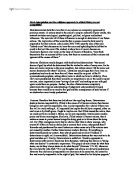Gavin Huggett
Compare hard determinism and Libertarianism.
However this theory of environment and genetics alone effecting our actions is contradicted by Libertarianism. In presenting their argument Libertarians often distinguish between a persons formed character or personality and his of hers moral self. Personality, according to libertarianism, is an empirical concept, capable of explanation and prediction and known through observation. The personality formed by genetics and environment limits the choice we have and makes us more likely to choose certain actions. This would back up the idea stated by hard determinists. However libertarianism goes on to state that however likely an action sated by genetic and environment it is not inevitable, it is possible for the moral self to counteract this. This then goes against hard determinism because in other words it is saying that even if your circumstance of genetic make up and environment go against you in your personality encouraging you to take certain actions, they can be overridden by the persons moral self. The moral self is therefore not empirical but an ethical concept, this is mostly involved in choosing between duty and self interest. In this respect, says the libertarian, the moral agent overcomes the pressures exerted by personality and becomes morally responsible for the actions, and this is what distinguishes us from animals. Morality is concerned with what people ought and ought not to do, but what hard determinism argues is what if we can’t have done otherwise? If they do not possess freedom of choice they cannot be punished. The challenge between the two then is that determinism speaks of the illusion of freedom and thus the absence of moral blame whereas Libertarianism disagrees.







